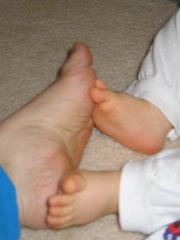
Friday night is the first night of Balticon and it is my night to play. So what do I do? I got straight to the science room. Dr. Donald Thomas, retired astronaut was giving a lecture on some of the science experiments he conducted on his 4 space missions and oversaw on the space station. Yes, this science groupie took a quick picture and asked for an autograph.

When I told him I dragged the kids outside on a clear winter's night to watch the stars, satellites, and the moon he recommended doing a Google search for "ISS sightings". When he went on to say pointing out the Milky Way, etc I told him I live in the DC metro area. We both agreed it is not the best location to view stars.
I am such a geek. I took notes during a lecture at a sci-fi con.
Dr. Don Thomas (STS-65, 70, 83, 94)
4 space shuttle flights
17 years with the program
Science experiments on the Shuttle
Experiments on the 2 week long shuttle missions ran up to 30 hours a day while on the space station there averages only 15 hours a week. This is just a small sample of the experiments he described and those were just a small sample of those done on his four missions.
Combustion science: in space there is no warm air rising to shape a flame. In space a burning flame looks perfectly round.
Japanese Red Belly Newt egg and embryo development were studies to see how space affect the development of the inner ear auto lift. The inner auto lift is a gravity sensing organ in many species including humans. The newts born in space had auto lifts twice the size of those born on earth.
Fish were studies to see how they would be affected by space. Fish not only use an auto lift but also use their eyes to determine which way is up. They had the fish in a tank which had lights mounted on four sides: top, bottom, right and left. They would randomly change which light was on. The fish would adjust their swimming orientation with the light "on top" no matter which light was on. After a while the fish adjusted to the change in the light source much quicker.
They grew human colon cancer cells in space so the 3-deminsional cell structure could be more easily studied. Similar cells are grown on Earth for research but those structures are flattened because of the natural gravity they are exposed to making some research more difficult.
Ham radio in space, evidently some of the astronauts snickered at the idea but once in space the opportunity to talk to students around the world became quite popular.
Most cities and country boarders cannot be seen from space with a few exceptions. The boarders of
On the shuttle there are 16 sunrises and 16 sunsets each day. Each one shows how small our atmosphere is. It is just a mere 25 miles thick. Each day a thin layer of that atmosphere made up of sodium and oxygen are activated by the sun and they glow at night surrounding the Earth's night sky with a band of green light. This light is called "air glow".
On one of his missions he watched the comet Hail Bob sail across the sky and sink below the horizon. After a moment he realized he had just watched a comet set. Then just 90 minutes later he watched set all over again.
After returning to Earth he had to re-adjust to the Earth's gravity. His inner ear had shut down. This is quite normal and usually takes about 24 hours to fully get back to normal. For those on the space station it can take 2 weeks. He says that is why you often see newly returned astronauts look "drunk" when turning a corner or turn their heads.
Earth KAM: students can control what photos are taken by programming a camera on the space station. It is a great way to get the next generation excited about space and science.
In 2004 President Bush set out the directive for us to go to Mars. This directive means the Space Shuttle program will be retired in 2010 to save funding for Mars mission projects to be funded. Each Space Shuttle trip in the 1990's cost about 1/2 billion dollars (US$). From now on 90% of NASA's efforts and funding will be going to the moon and Mars. They hope to be on Mars in 40 years. This will not be a trip for any of us. It will be the trip of a life time for our children.
Right now I cannot imagine my children going off to college let alone to Mars. If it becomes their dream, it will be mine too.



No comments:
Post a Comment